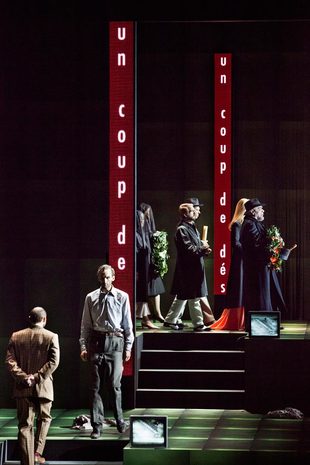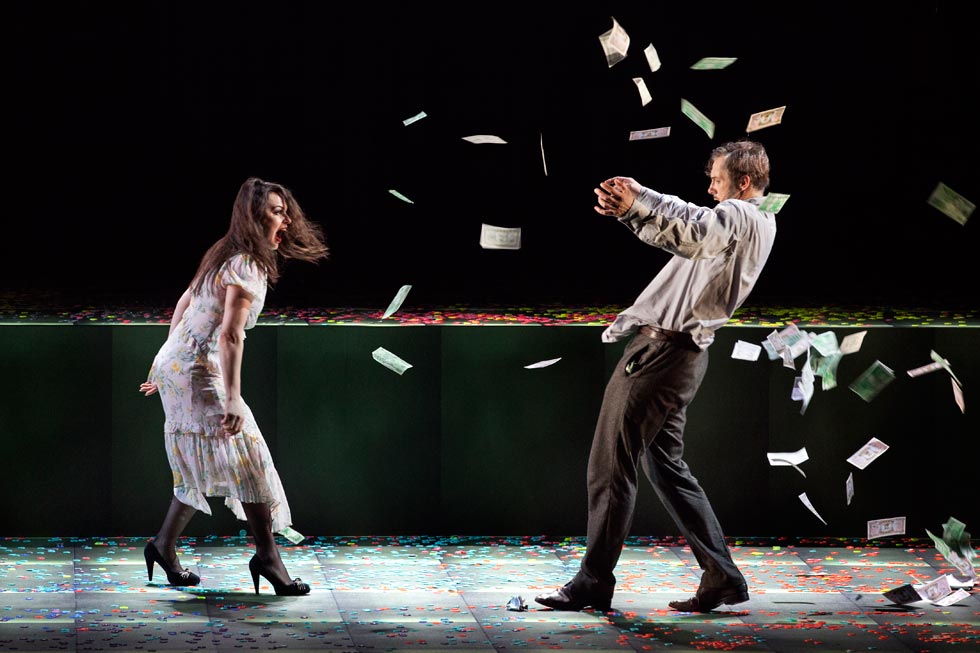Karin Henkel turns Prokofiev's opera "The Gambler" into an ingenious piece of music theater Epilepsy, a gambling addiction and a murderous deadline. Just a selection from the list of ailments and circumstances that surrounded the conception of Fyodor Dostoyevsky's The Gambler. Lack of money and a resulting strangulation contract with a publisher (he would lose the rights of all of his works when he wouldn't meet the deadline) forced Dostoyevsky to write a novel within four weeks. Drawing on his own experience as a gambling addict, he wrote The Gambler, a story about a man who looks back on his own downfall. In 1915 Sergej Prokofiev started to write an opera, based on this story of Dostoyevsky. He took out the retrospective view and told the story in the present time. For her production for Opera Vlaanderen of The Gambler, director Karin Henkel brings back the flashback of the novel. It is her first opera production but her third production concerning a piece of Dostoyevsky. In a clever staging she shows her affinity with the writer and his talent to put moral decay and dormant lunacy in a gripping narrative. In addition to the perspective of hindsight, Henkel provides the main character, Aleksej, with a double. It is with him that the opera begins. Aleksej, or rather his doppelganger, wakes up in a hotel and tries to recollect the last eight months of his life. He tries to reconstruct his own deterioration - hoping to see something, if only a glimpse, of his real self in all those memories. Aleksej's doppelganger is played by dancer Miguel do Vale who is, from a narrative point of view, the real protagonist of this story. An opera with a dancer in the lead. A dancer who physically responds to the story that he sees passing by in his memory. Karin Henkel, together with set designer Muriel Gerstner, let the story take place on a stage that consists of three levels. Three levels within which we see present, past, reality and dream depicted without sharp distinction. It's a deliberately chaotic whole in which Henkel, with great dramatic and comical effect, shows the decay of Aleksej and the moral deprivation of the people around him. In composing The Gambler, Prokofiev was largely inspired by Modest Mussorgsky and his opera "The Marriage". An opera in which Mussorgsky took the rhythm of spoken word as a guiding principle for the writing of the vocal lines. He thus came to an opera consisting solely from recitatives: an "Opera Dialogue". In The Gambler, speech simulation - a musical translation of voice proxies, something that would in Janacek's operas reach a certain zenith - and martellato, a hammering staccato, results in a piece of music theatre that is filmish rather than it is operatic. One will look in vain for an aria - or a beautiful melody in the sung text (the lover of Italian opera has been warned). The arioso recitativo of the dialogues, which are largely copied 1-on-1 from Dostoyevsky's novel, are almost continuously agitated in character. The aspect of contemplation of Dostojevski's novel is a bit left to it. In interludes with spoken texts, coming from the novel, Henkel gives Prokofiev's opera some relief. She grants us a few moments in which we are given a more intimate look into the inner world of Aleksej.  © Opera Vlaanderen © Opera Vlaanderen The Sprechstimme and Sprechgesang in, let's say, Wozzeck, don't stop that opera from making an emotional impact and although The Gambler certainly makes its mark, it's the Russian-kind of Sprechgesang together with the language that keeps the story, for me, at a certain distance. The question rises whether a text-based opera like The Gambler would benefit from a translation in, for instance, English. That one, rather than listening to sounds that doesn't make it into meaningful words, gets a better grasp of the finesse of the speech simulation when one hears it in a language that one is, more or less, familiair with. That the idea that lies behind this way of writing vocal lines becomes more eminent, literally more meaningful, and results, eventually, in a performance that is, in the end, a more engaging one. (As the English translation of "The Makropulos Case" did. That recording of an ENO-production did shed some light in Janacek for me.) In an opera that doesn't dwell on beautiful arias, with music that is more orientated on action than melody, the acting of the singers is, even more than usual, as important as their singing. Ladislav Elgr as Aleksej and Anna Nechaeva as Polina perform that task, together with the rest of the cast, more than adequately. But it is Dostoyevsky-expert Karin Henkel - with an ingenious staging in which she does justice to both Prokofiev's musical wit and sarcasm as well the stratification of Dostojevski's novel - who is the real star of the evening. Opera Vlaanderen 17 June 2018 Dates: 13 June until 7 July 2018 Conductor: Dmitri Jurowski Regie: Karin Henkel Decor: Muriel Gerstner Polina: Anna Nechaeva Aleksej: Ladislav Elgr The General: Eric Halfvarson Babulenka: Renée Morloc The Marquis: Michael J. Scott Blanche: Kai Rüütel - Wouter de Moor
0 Comments
Leave a Reply. |
TIMELINE
July 2024
|


 RSS Feed
RSS Feed